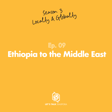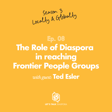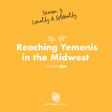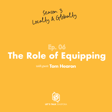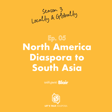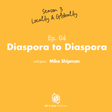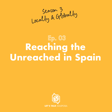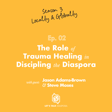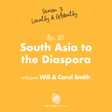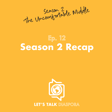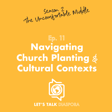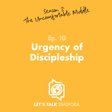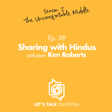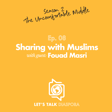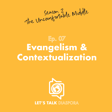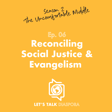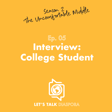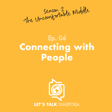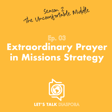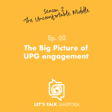Become a Creator today!Start creating today - Share your story with the world!
Start for free
00:00:00
00:00:01

Bonus Episode
In this episode, Rebecca and Bud are joined by Pastor Daouda, who shares his incredible journey from a Muslim family in West Africa to becoming a Christian and planting churches in New York City. Pastor Daouda's story is both encouraging and challenging as he talks about the importance of loving and welcoming newcomers, especially those from Muslim backgrounds. His ministry focuses on reaching out to West African immigrants, sharing the Gospel, and planting churches.
Learn More about West Africans in North America:
VIrtual Prayerwalks among West Africans
Find Gospel Resources for West African Peoples
Learn more about the ethnicities of Metro NY
ethNYcity: The Nations, Tongues, and Faiths of Metropolitan New York
Transcript
Introduction of Pastor Dauda
00:00:11
Speaker
Judd and I are here and excited about a special guest that we have with us. Yeah, we have pastor really the purchase to hear his story. As you know, we were focusing on the diaspora in really all across the world, but specifically in the West and just its implications on gospel activity and the expansion of the kingdom.
00:00:33
Speaker
I'm not even going to do much of an introduction for Pastor Dalda. We're just going to hear his story, and it's our prayer that you're encouraged, but also challenged to really take serious the things that you're hearing and putting things into action so that we can continue to see God's glory cover the earth as the waters cover
Journey from Burkina Faso to the U.S.
00:00:53
Speaker
the sea. So welcome, Pastor Dalda. Hello, everyone.
00:01:00
Speaker
Pastor, would you just introduce yourself? Tell us where you're from, how long you've been in the city that you're at. Just start telling your story and we'll ask some additional questions along the way. Okay, let's start. My name is Dauda Zongo. I'm from Burkina Faso, a West African country. And I came to the U.S. in 2003, January 2003.
00:01:29
Speaker
As you can see, you can hear Dauda is a Muslim name. You know, I became a Christian after my Muslim. And the reason from coming to United States is to run for my life and find a place to serve my and live peacefully and serve God. This is my short story. Tell us a little more about your story in coming to know Jesus.
00:01:58
Speaker
I just want to thank God, you know, this is a privilege for me to, you know, bring back this story of encounter with Jesus Christ. As I said earlier, coming from a Muslim family, from West Africa, you know, my father is a Muslim leader in
00:02:25
Speaker
and used to teach the entire family to follow the religion of Islam and therefore every member of the family have to go to learn to weed the ground or go to a neighborhood country to
00:02:47
Speaker
to learn the crown. And for me, he decided to send me to former school in French from the place he sent me to. I met a friend who was a Christian. He's the one that introduced me to Christ, Jesus Christ, by his behavior. He was a young man that really shared the love of Christ to me. And for me, he was so special, and I wanted to be like him.
00:03:16
Speaker
And therefore, he introduced me to Christ and gave my life to Christ and I became a believer. And I went back to tell my family that I became a Christian. And it was the beginning of my process, you know, of being persecuted and trying to kill him many times, poison many times.
00:03:43
Speaker
I was running from my life from place to place. By the grace of God, I can see that African family is not like two or three members. Family is like a big family of 60 tribes. And for my father, I was a child that would bring shame to the family. And therefore, killing me is
00:04:13
Speaker
According to him, it's like taking out of the family the bad seed. And this is his expression. The bad seed, they're trying to contaminate the rest. Because I became a Christian, you need to take the bad seed from the family so that will not contaminate the rest of the family.
Arrival and Challenges in NYC
00:04:34
Speaker
The reason why he explained the persecution, even trying to kill me because
00:04:40
Speaker
For him, it's better to have an entire family Muslim than to have one of his children becoming Christian and being in the midst of the family. This is the whole process. My best friend who introduced me to Christ was really the person that helped me to escape the persecution of my family. How he did it?
00:05:08
Speaker
He wanted to ask for a visa in the United States Embassy and I found myself in New York City in 2003. For him it was a way of me helping me to escape the family persecution and I came to the United States in 2002. Can you tell us a little bit about your story as you came into the United States and what did that look like for you?
00:05:32
Speaker
For the first time, as you can see, January 2003, not knowing anybody in the city. I spent 10 hours in the airport, in JFK airport, by myself, and I was looking for help. Nobody was helping me. And I spent the time over there. And believe me or not, the 27th of January 2003 was
00:05:59
Speaker
storm, snowstorm in New York City. It was my first time to, you know, to see this snowstorm. It was so deep, so it was cold and was afraid to go out by the grace of God. One young man helped me and took me to a place in Harlem where we can, I can't find the West African community.
00:06:27
Speaker
And from there, nobody was able to take me in. And I spent the night on the subway, you know, on 116th Street. It was my first night. And early in the morning, one young man from a neighborhood country, I can call it, Ivory Coast, just found me. And I was bleeding from my nose.
00:06:54
Speaker
because of the bleeding, it took me to his place and I stayed there from this, from this place. Or he found another person to help me so that I can stay, you know, more warm in the, in 2000, January, 2020, 2003.
West African Community in NYC
00:07:14
Speaker
So. So pastor, um, just from my, my experience, most of the,
00:07:21
Speaker
people in North America know probably less about West African people than like some of the other peoples who's been on the news more and like refugees like Afghanistan, Syria, Iraq. Tell us in New York City, there's a pretty large and growing West African population, correct? Yes.
00:07:49
Speaker
The West African community, especially they speak French or English, West African, and Muslim, you know, Muslim community, and they really
00:08:08
Speaker
There's a growing population for West Africa and New York City, especially in Harlem, in the Bronx, in some other part like Brooklyn. Believe me, I can't just, can I give you the exact number, but there's more than 100,000.
00:08:27
Speaker
people, from ethnic groups, different ethnic groups. Can you tell us, and our listeners, what countries primarily make up the core of West Africa? Which countries are those would be considered West Africa? West African countries, you can see the western part of Africa.
00:08:55
Speaker
especially you will see Ghana is a West African country in Nigeria, Africa, Sierra Leone, Liberia. It's a very country that speaks English, but there's a French country like Virginia, Niger, Burkina Faso, Mali, Benin, Togo. We have a large country from Senegal, most countries, you know.
00:09:25
Speaker
A larger one is Nigeria, mainly Nigerian, but they speak of English, but we have the French-speaking countries.
Building a Church Community
00:09:35
Speaker
We have a generic country. There's a lot of countries. Yeah, and my understanding is some countries have a lot of Christians, some have predominantly Muslims, but West Africa is a very Muslim
00:09:48
Speaker
region with a lot of tribal areas, a lot of different dialects and languages, very diverse, but you do have the English and French kind of trade language. So you say maybe over 100,000 West Africans in New York City. That's an amazing opportunity considering that many of them are coming like you from a Muslim community, a Muslim family.
00:10:14
Speaker
Can you share with us, you know, you shared your kind of first day in New York, but tell us about your journey of getting to where you are now in New York and you can go back as far as you want or go as slow as you want. But we would just love to hear, you know, we're calling you Pastor Dauda now. How did we get to that point and how has God orchestrated ministry among West Africans in New York City?
00:10:45
Speaker
Okay, let me go back. First of all, when I came and I spent my first night in the subway and I found a police lady to stay with a friend, the second thing to do is look for a place to worship. I'm a Christian and I went to ask the same friend who helped me, how could you help me to find a church? And because he's a Muslim friend,
00:11:12
Speaker
They were telling me, you know, I'm not a Christian. I don't know exactly. I know there is a lot of churches around, but I don't know exactly. I don't go to church. And one day it took me to a place. He said, this is a church on my way to work. I've seen the church from time to time. You can go there if you want to. And I start
00:11:34
Speaker
attending the service of the church since I came. And from, you know, the thing is that I'm speaking French, and for me to be attending English church services, it was not really hard. You know, I was like, oh, a stranger in the midst of, I do not know even what they say, you know, can't speak the language.
00:12:03
Speaker
I don't know what they're saying, but one thing that kept me there, I believe this, we have the same hymns. I can see this, it looks like we sing this song in our church when I was back home. And the hymns was, okay, I can stay here.
00:12:21
Speaker
You know, I spent my first year staying on the pew and staying there, listen, you know, and there we see me out in AIM Sundays. And one day, one of the leaders asked me, where are you coming from? And I told him, I'm coming from West Africa. He said, I look like somebody he met from
00:12:46
Speaker
the Caribbean or South Africa. And I said, no, I'm coming from West African and French speaking country. And he stopped me, they said, can you tell me more about you? And I told him my story, where I came from, where I found the church. And he said, why you did not introduce yourself? I said, I don't even speak English with a thing. I'm going to go and introduce myself. I'm just going to come and worship with
00:13:14
Speaker
with the people. I said, for me, being part of a congregation is enough for me. Just praise God and let's go back where you're supposed to go. And from the place, the leader will ask me, okay, I want to meet you more and listen to your story. We spend the time together
00:13:33
Speaker
And I told him the story from my confession to the persecution. He listened to you very well and said, how you escape all this and to be here by yourself. Do you have a family back? I said, you have my wife, my daughter. They will all agree for me to live. Otherwise, I will be dead back home. Therefore, escaping from my life was the only solution for me, the best for my family.
00:14:02
Speaker
I came just to escape the persecution and death. And he said, OK, what are you going to do? I said, for me, yes, it's a place of freedom, you know, at this stage. Allow me to do what I'm supposed to do. I said, he said, oh, what do you want to do? I said, I'd like to evangelize. And I started evangelizing on the street.
00:14:28
Speaker
And from the evangelization, I have two or three members or three friends who converted first. We started a small group. I came to the church and I told them it was 2005. I told them I have four young men who live their life to Christ. And we started a little group prayer meeting and Bible study.
00:14:49
Speaker
And later on, I took the group to one place when I was staying. And the group grew to be four, five, six, and eight, became 10. I brought back the group to the church. We started prayer again, meeting. And the group grew. And the leader one day was in his office. He said, it looked like this is going to be a church.
00:15:15
Speaker
and said, okay, I don't know, but we praising God, we studying the Bible. We have at least 15 people who gave their life to Christ. And the leader asked, did they baptize? I said, not yet. And he organized a world baptism, and we baptized them from the place. You know, I continued the divine creation of the street.
00:15:42
Speaker
And in 2007, the group grew to be like 40 people. In 2008, the leader said, OK, let's start a church from French-speaking countries. And from there, we started the church. In 2009, we became officially a church. And the church, we still evangelize. We say we're wishing out, especially to the Muslim community.
00:16:12
Speaker
And most of our new members are converted from Muslim countries, from Muslim families, because they're coming here and they have a freedom to receive the gospel, not being persecuted. I believe this is the door that God has given to us
00:16:42
Speaker
for me because it's a freedom, a free country or the freedom has been really called for this country. Therefore, when people come here, what they cannot do back home, they can do it. He's talking about believing in Jesus Christ. If they have been exposed with the gospel, if they have been exposed with the gospel. And God used this avenue to bring
00:17:12
Speaker
many Muslim took faith to our ministry. In 2015, God gave us an open door to New Jersey, a neighbor state, and we went to open over church over there. It's growing almost 200 people over there. And it's Muslim background people. I believe this is
00:17:40
Speaker
I'm not saying that I came as a refugee or I've been sent to do what God called me to do. All this, Peter, what I'm saying is this is the end of God is behind all this,
Converting Muslims through Kindness
00:17:53
Speaker
you know? For me, I was running for my life. For him, he was sending me to do what he called me to do. That's what I can see. Yes.
00:18:06
Speaker
I love hearing that story and how it encourages and challenges my faith, even as you talk about the importance of just keeping Jesus first. Even as you went into a church that doesn't speak your heart language, you know, you knew that you were with like, you know, brothers and sisters in Christ, worshiping the Lord in different languages even, but your heart was still just focused on Christ and even going out.
00:18:31
Speaker
Tell me, Pastor, how did you provide for yourself as you were doing this and getting started? Oh, first of all, I want to thank God because God's faithfulness prevailed. Coming, I have a friend, I met a friend in the church. I guess, I don't know, he became like, he brought it to me and was helping me, clothing,
00:18:56
Speaker
and found a new job, a little thing that I can do for money. It's just a little bit, it was supporting me even to help my family back home. And it was American, African American. We've been together for, since then, you know, it became like a family member to me.
00:19:19
Speaker
Let me say this, I can see the faithfulness of God because I know for me to find a place to stay was not easy. I've been from place to place these places, you know, was not easy, but God faithfully prevailed. You know, I can see it. I believe the whole picture that I can see is the end of God.
00:19:46
Speaker
providing and protecting. You know, don't tell me what you want me to do. That's it. What I can see. You know, many doors have been opened to me. You never lock anything by the grace of God because God has been so faithful to me. Yeah.
00:20:06
Speaker
The listeners can't see me, but while you were telling this story, I just couldn't stop smiling. This is so encouraging just to hear, again, not necessarily of your uniqueness, but God's faithfulness and your perspective of seeing God's faithfulness in the midst of challenges.
00:20:27
Speaker
you know, a lot of people are coming to the United States and Canada as refugees, but without the hope of Christ and without an eternal perspective. As you have interacted in the last, I guess, you know, 20 years with, you know, specifically West African immigrants who are Muslim
00:20:51
Speaker
What are the challenges you see in them? What are common experiences? And how have you seen your church and other churches really meet those needs in a very gospel-centered way?
Challenges and Support for Immigrants
00:21:05
Speaker
Is there any examples that come to mind that you could share with us? Oh, you see, this is the important part of the ministry.
00:21:17
Speaker
This is, you see, coming to my own experience helped me a lot. Because, you know, coming in the country where you do not know people, you don't even speak the language, was not easier. You can understand, or somebody would not speak the language coming to a country. You can just picture yourself in the country like a French-speaking country.
00:21:47
Speaker
How are you going to manage? For me, because I went through all this process, it allowed me to understand how to welcome those who are coming in this country. And first of all, let me give you a short story, and the story that really I know I saw the end of God. One day I came from a prayer meeting from Jersey.
00:22:16
Speaker
February cold, cold weather. And I found at my door a young man sitting with his suitcase. And as soon as I came, I asked him, where are you coming from? What's your name? He said, I'm coming from, I gave the country and coming from Burkina Faso. And one, I stayed at the airport.
00:22:42
Speaker
I spent the night over there and young men from another country dropped me here because he said, if I drop you at the pastoral place, you can spend the night at least over there. And I do not know the person and I said, okay, it's cold. Let's go inside. I took inside and they give me a place to stay warm clothing and, you know, have given me food.
00:23:07
Speaker
He spent the first day with me, never asking me a question, go out and stay there. One week we share and every day I go out and follow me. We just walk around and he spent the night, he spent almost six months. I never questioned him, were you coming? What are you coming to do? They were staying there and I was looking for a job or place for him to go. But it was, it's there.
00:23:37
Speaker
He asked me a question. Can I talk to you pastor? I said, yes, you can talk to me if you want to. He said, oh, my name is Abdullah and I want to give, I want to become a Christian. And he said, what do you, you want to become a Christian for what? He said, pastor, you never invite me to church, but you, you took me in.
00:24:01
Speaker
and you fed me and you gave me clothes and you never even shared the gospel. Why you did not do it? I said, no, I'm not gonna force you to do anything. I said, oh, the young man asked me a question, telling me, oh, I want to become a pastor, I want to become a Christian.
00:24:22
Speaker
Can I tell me how to become a Christian? And I'm asking, why are you going to become a Christian? Because I took you in, or what? He said, no. I just want to become a Christian. Because the way you receive me, the way you love me is special. And I want to become a Christian. And I said, OK. I said, this is not me. This is Jesus Christ. He's a lovely person.
00:24:51
Speaker
just you know don't think that i'm special jesus is a lovely person he loves all of us and what i'm trying to do is to be like him i said you see and i chose him to the gospel how jesus came on the earth died for our sin and our faith in him will give us salvation and explain him you see i was a Christian with a Muslim environment and God
00:25:18
Speaker
call me and send me here and I'm doing what I'm supposed to do. I took him to the church, he started attending our church and he became a member, he became a evangelist, doing the same thing. You know, this is a story that every time I think, okay, if we as a Christian can trust God and open our doors
00:25:44
Speaker
to what the people that are coming to our neighbor, God can use us and bless them and reveal Himself to them, you know, to our lives. Sometimes we just want to bring the gospel to them, and especially Muslims, they will not receive it like that way. No, because they don't even believe the Word of God. If you go talking about the gospel, Jesus said the Word of God said they won't
00:26:12
Speaker
But our behavior can be the gospel, I believe. Receiving them, loving them as our neighbor is a way to introduce them to the gospel. This is what I've learned. And this young man bought two or three of his friend
00:26:38
Speaker
to our church and they became a Christian. It's not one example. I've seen many and becoming Christian like through our ministry and bringing other people. It's not me, but you know, we were just, you know, doing what God called us to do. And as soon as one is converted, go tell the rest and they will come. I believe this is how we have seen the church going with Muslim being, becoming Christian.
Future Projects and How to Help
00:27:07
Speaker
Pastor, as you tell me that story, I just think it sounds like the Bible. Your story sounds just like the stories from the scripture. We just need to be faithful in giving and sharing and being available for people. And the time that it took, I think is important too, that you just spent time with them. Thank you for sharing that story.
00:27:31
Speaker
Pastor Daud, as we start to wrap up, really just so grateful for you, brother, and your testimony and how God has used you, and knowing that you're continuing
00:27:49
Speaker
this this work. So I just want to give you an opportunity to share with our audience any anything that you have upcoming like projects or initiatives like someone wants to get involved and support your work among French speaking West Africans in New York City
00:28:08
Speaker
Just share with the audience anything you want to share of how they could participate, contribute, be praying for any of the above. You can make the ask now, brother. Thank you. First of all, as a Christian, we need just to lift our prayers to the newcomers. You see, New York City recently, I've seen a multitude of
00:28:38
Speaker
West African in the street. You can see them maybe in the news, immigrant on the street. And our project for now is to pray for them, go visit them from time to time, you know, and see what we can do. Just be in the street. I walk through the street every day, you know, interacting with them.
00:29:04
Speaker
and see what opportunities Gazi will give me to just bring the gospel. I believe this is the first summer they don't have a place to stay. I'm not sure that I can find a place for them, all of them, but at least I can just go on their places and see what I can do. You know, one of my friends was inviting me last time to go from their place and see if they can, you know, we can help them with the language, direct them
00:29:34
Speaker
to place a way they can find help, even thinking about starting an ESL class. And I said, well, we'll be good, you know, if you can start an ESL class, you know, learn to learn in English, what to speak, you know. We're thinking about it. And we have a weekly, weekly Outreach Street also. Every Saturday, I have a team that goes out
00:30:03
Speaker
reaching out to the people on the street, not just only West African, but people that we meet on the street. But our target is West African, Muslim, speaking French, and also our members, they mostly work as a delivery
00:30:26
Speaker
guys on the street with e-bikes and we train them to be like evangelists everywhere they go you know take the gospel to with the food or to with the delivery package you know this is what I'm trying to explain them you know wherever you go go with the gospel with the package you know don't force them but at least let them know that you believe in Christ and you desire just to deliver
00:30:56
Speaker
on the package, but the good news also, you know, as you're doing it, you know, the blessing will continue to flow. This is where we see our impact in the city. You know, that's allowing myself to be a tool and instrument in the end of God, to bring the gospel to the nation. This is my, was deeply, is in my heart and my prayers for those owners who pray for us.
00:31:25
Speaker
And no, prayer is the key. It will open doors for us. You want to participate in any way, just join us in the street one day if you feel like it can be good. Just share our experience. Go out, share your testimony, pray for people, interact with yourself. You can make your life come for Christ. This is what I think. And pray that, you know,
00:31:55
Speaker
You know, we don't just only target New York City. I already have another city in my mind. It's New York, New Jersey, New Jersey. We're already there and looking for another city again just to go, you know. If a key person can be there, you know, we establish our quarters or headquarters to help, you know, a regional donation. This is what we plan. We have like a project.
00:32:24
Speaker
evangelism make a disciple of planting church. We already have two churches being planted. I think every year we have almost 10 to 20 new believers being baptized from Muslim background. And we baptize them anyway. We can have a pool in our backyard. We baptize them over there.
00:32:53
Speaker
take them to the places, you know, all over the place.
00:32:59
Speaker
Yeah, Pastor, thank you for sharing just a couple of resources that I want to mention. UPGNorthAmerica.com has a few virtual prayer walks among some West African communities in Metro New York. We'll put those in the show notes. So if you're not in New York, but you want to be praying, you can see the faces and places where Pastor Dauda is going on the street and his team and sharing, and you can be praying in those places.
00:33:27
Speaker
You also mentioned other cities. I know that there's large and growing West African populations in a few cities in Ohio. I know there's some West Africans in Dallas-Fort Worth. They're not just in New York, but if you're in other cities and you're saying, man, the Lord's really stirring you to reach out to West Africans,
00:33:48
Speaker
We want to help you in that way. And Pastor, just to close, I think, Rebecca, can you pray for Pastor Dauda and his church and the ministry they have there in New York City?
00:34:05
Speaker
For sure. And I do, as Pastor Dauda was sharing, I was thinking about all over North America, we have students as well as adults now that have taken French classes. What an opportunity to be able to go and practice your French.
00:34:21
Speaker
and grow in your French speaking and being able to walk Bible times with Pastor Dauda. So I just encourage those out there that have that French speaking background or are learning French to get out and share Christ and practice using your French. Let me pray for you, Pastor Dauda. Thank you.
00:34:44
Speaker
Dear Father, I thank you for this dear pastor and his wife and child, Lord, and 24-year-old child, Lord. I pray that you would just protect them in every way. Continue to use them bodily, Lord. I just thank you for his testimony and how you've been working in and through his life.
00:35:07
Speaker
just the many West Africans and others that you are giving him opportunities to share with his family, opportunities to share with and to be available to and to love on those that don't know you, Lord. And I thank you for just his lack of fear, Lord. I thank you that he just goes forward, Lord, trusting you and not worrying about, you know,
00:35:35
Speaker
how this is going to be provided or how this is going to be provided, but knowing to keep his eyes on you, Lord. And I've just really heard that in his testimony today of how he's just kept his eyes on you and just continue to move forward and just watched how you provide, Lord. So I pray that we would all be encouraged by his testimony. I pray that we would be available to those that
00:35:58
Speaker
You put it around us, Lord, and may we see those opportunities and not miss them and that we would spend time and share your truth, Lord. And I do pray that you would stir in our hearts to continue to pray for Pastor Douda and be with him as he walks out. I pray even today as he goes out, Lord, that he would meet someone and be able to share your truth and your love with them, Lord.
00:36:27
Speaker
that you would just model and your spirit would just continue to overflow through him and his family. We just love you and thank you for what you're doing and do pray that we would be obedient as our dear brother has been obedient to you and glorified you in so many ways and continues to glorify and honor you. We just lift them up and thank you for this time in Jesus name. Amen. Amen. Amen.
00:36:55
Speaker
I hope you enjoyed this bonus episode of Let's Talk Diaspora. Looking forward to season three, we're excited to share with you that we're going to be looking at this context of diaspora where it's both locally and globally and how they're connecting. We're going to have some guests on with us and we're going to be talking about seeing the diaspora reaching the diaspora.
00:37:16
Speaker
We're going to talk about frontier people groups and what part the diaspora and reaching frontier people groups play. We're going to talk. We're going to have guests who have served overseas and now back in a Western context working with those same people groups and hear how those principles translate.
00:37:33
Speaker
We're going to be hearing from people who are working overseas, but they started with working with the unreached in the diaspora. We're going to be expanding beyond our typical North American context. And we're going to be bringing in some people from different parts of the world working with unreached people groups in the diaspora. And then two final things that we see that transcend location is the role of social media. We'll be hearing about that.
00:37:59
Speaker
and then something that's really important with people on the move and migration is the role of trauma healing and discipling the nations among the diaspora so we're looking forward for you joining us in season three of let's talk diaspora be sure to like this content if it's been beneficial subscribe so that you'll know when new episodes are released
